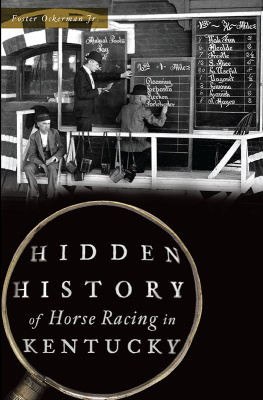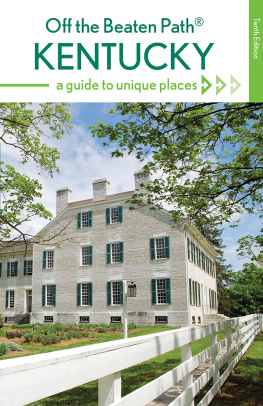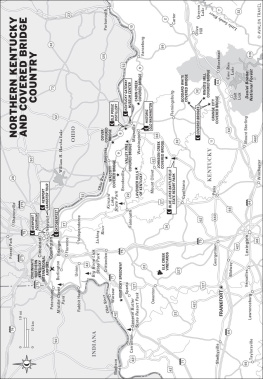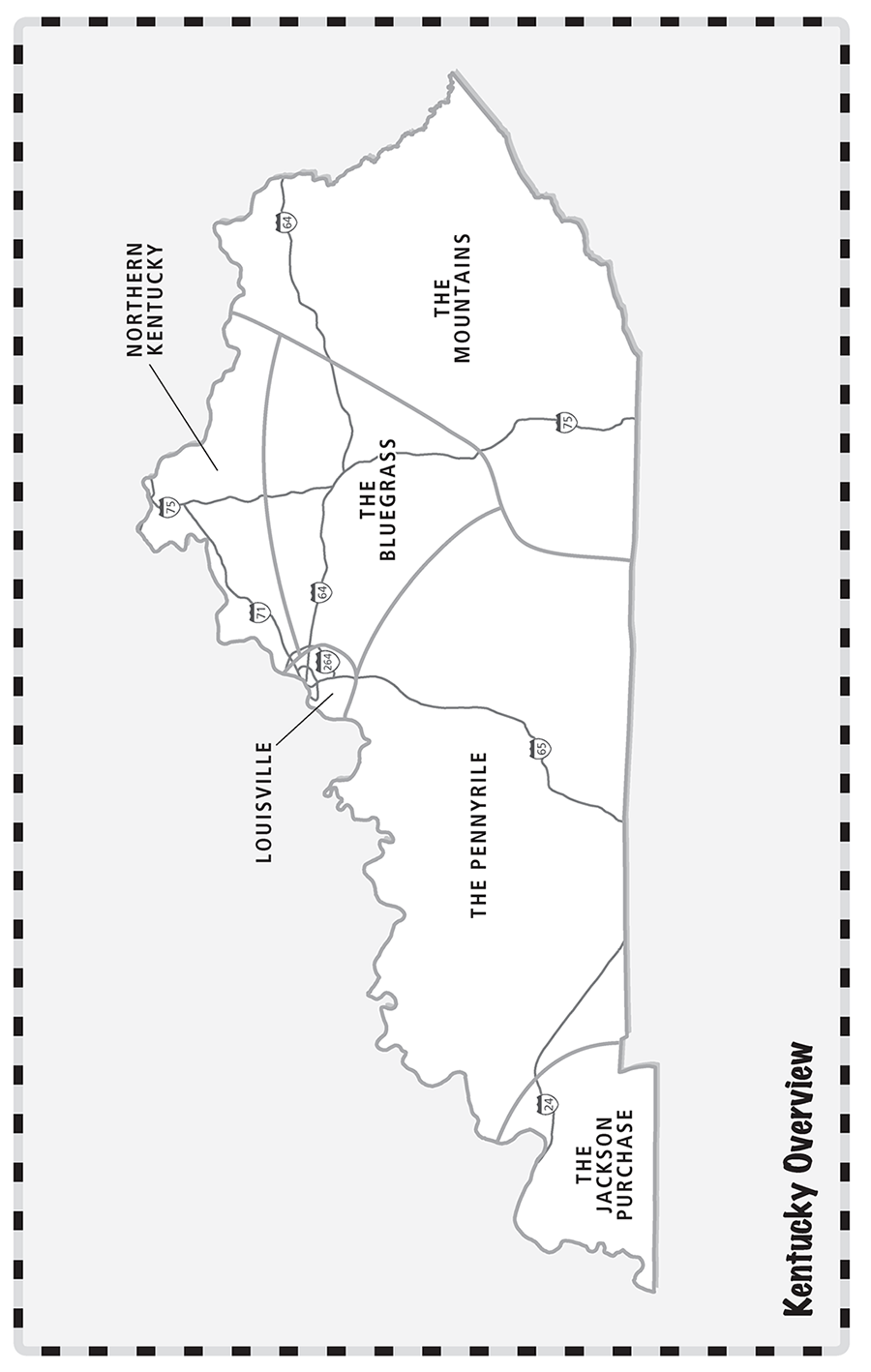The prices, rates, and hours listed in this guidebook were confirmed at press time. We recommend, however, that you call establishments to obtain current information before traveling.
Copyright 2003, 2007, 2013 by Morris Book Publishing, LLC
ALL RIGHTS RESERVED. No part of this book may be reproduced or transmitted in any form by any means, electronic or mechanical, including photocopying and recording, or by any information storage and retrieval system, except as may be expressly permitted in writing from the publisher. Requests for permission should be addressed to Globe Pequot Press, Attn: Rights and Permissions Department, PO Box 480, Guilford, CT 06437.
All photos by the author unless otherwise noted.
Maps by Alena Pearce Morris Book Publishing, LLC
Project editor: Lauren Brancato
Text design: Bret Kerr
Layout artist: Casey Shain
ISSN 1932-7358
ISBN: 978-0-7627-6976-6
Printed in the United States of America
10 9 8 7 6 5 4 3 2 1
To Melanie.
She knows why.
acknowledgments
F irst and foremost Im indebted to the people of Kentucky, past and present. This book wouldnt have been possible if Kentucky had been one of those boring states. This book also wouldnt have been possible without the generous help of the following people: my coauthor, Liz Baldi; my research assistant, Ashley Rae Needham; Jayne McClew of the Kentucky Department of Travel; Meta Marie Ball of the London-Laurel County Tourist Commission; Roy Bud Davis of Bert & Buds Vintage Coffins; Bill Williams of the Louisville Slugger Museum; Bob Moody for Chicken Wolf; Tony Terry and Lane Gold at Churchill Downs; Jackie Jones of Hodgenville; Irma Raque of Kaelins; Steve Vest and Mike Embry of Kentucky Monthly magazine; Jena Monahan of the Courier-Journal; David Jenkins, Laura Maraldo, Bruce Haney, Rod Irvin, Ronni Lundy, Larry Magnes, David Inman, Tom Jester, and Chris Wohlwend; my wife, Melanie Staten; my editor, Tracee Williams; and all the curious people of Kentucky (you know who you are).
And, finally, I recognize that a few towns will question their inclusion in a particular section. It was for geographic simplicity.
introduction
How to Understand Us in Kentucky
W hen settlers from Virginia began pushing westward in the middle years of the eighteenth century, they hit a wall, literally. The Appalachian Mountains, which etched the boundary between Virginia and what would become Kentucky, seemed impenetrable.
But in 1775 a woodsman named Daniel Boone discovered the door through that walla gap in the mountains, the Cumberland Gap. Youve probably heard about him and his discoveryit was in all the papers. When Boone and his band of thirty hearty souls crossed through that gap, they found a virgin land, completely unspoiled by human inhabitants. That was because not even the Indians would live there. Native Americans hunted on the land they called Kentake (an old Iroquois word meaning the hunting grounds) and battled one another over hunting rights. But not a single Indian tribe claimed Kentucky as its home. It was just a nice place to visit and shoot deer. A lot of folks, particularly in the surrounding states, still feel that way. Good place for hunting, but I wouldnt want to live there.
But soon many people did live there. The Cumberland Gap opened the way west, allowing pioneers from Virginia and North Carolina to rush into this uncharted territory and chart it. They pounded claiming stakes into the ground every hundred yards or so, laying claim to this parcel of land that extends from the giant Oak ten steps from Grundy Creek to the tall Maple visible on the westward ridge and to that parcel of acreage beginning at Harmony Crossing and extending north to the fork of Owl Creek. Kentucky was soon a mishmash of competing land claimsso competing that when Kentucky was granted statehood a mere seventeen years later, in 1792, the deed map resembled a badly sewn quilt.
Kentuckys land deeds were a house of cards, a situation the US Supreme Court recognized when it ruled in an 1809 Kentucky land dispute titled Bodley v. Taylor: The very extraordinary state of the land title in that country [Kentucky] has compelled its judges, in a series of decisions, to rear up an artificial pile from which no piece can be taken, by hands not intimately acquainted with the building, without endangering the structure and producing a mischief to those holding under it.
Not even the Supreme Court of the United States understood Kentucky. The justices just threw up their hands and said, Fellers, you all know what you did. You work it out.
The land claim mess was what drove Kentuckys founder, Daniel Boone, to move on. At the end of his life, embittered over getting swindled in a number of land deals, Boone left Kentucky and moved to Missouri, where he died and was buried. Of course Kentuckians couldnt allow that. They stole over to the Show-Me State under cover of darkness, asked a resident to show them where old Danl was buried, and spirited his ashes back to Kentucky for a proper burial. But thats a whole nother story, told elsewhere in this book.
Folks, its been pretty much the same ever since. Kentucky is a land unto itself. No one in the other forty-nine understands us, or needs toexcept when traveling through and seeking directions. Thats when we mess with your mind: Okay, you know where the Gulf station is? No, well, how about the Mini-Market?
Kentucky is a curiositya curiosity all its own.
One day a year Kentucky is the most famous state in the Union. Thats Derby Day, the first Saturday in May, when the annual Kentucky Derby is run at Churchill Downs. On that day Kentucky is the home to fast horses, beautiful women, and great whiskey. For the other 364 days it is home to fast women, beautiful horses, and people recovering from too much whiskey. This dualityhey, were important today, but tomorrow were nothingis a perfect reflection of a state of great curiosities.
Kentucky is the home of one of the most famous people in the world, Muhammad Ali. It is also the home of one of the most infamous, Charles Manson (his boyhood home is in Ashlandunmarked, of course).
Americas first poet laureate, Robert Penn Warren, one of the most esteemed writers of the twentieth century, was a Kentuckian, as was gonzo journalist Hunter S. Thompson.
Illinois may have LAND OF LINCOLN on its license plates, but Kentucky was where Honest Abe was born. He just moved away rather quickly.
Curious, right? In fact, our license plate should say: KENTUCKY, LAND OF CURIOSITIES. It doesnt, of course. It says the BLUEGRASS STATE. And thats kind of curious itself. You see, bluegrass isnt blue.
These curiosities extend down to our counties: You cant buy a drink in Bourbon County (its against the law to sell alcohol there), but you can in Christian County. Barren County is lush; Green County isnt.
The Jackson Purchase area of Kentucky wasnt purchased by President Jackson. He wasnt president in 1818 when the land was acquired from France. And while he did broker the deal, he didnt purchase the land.










